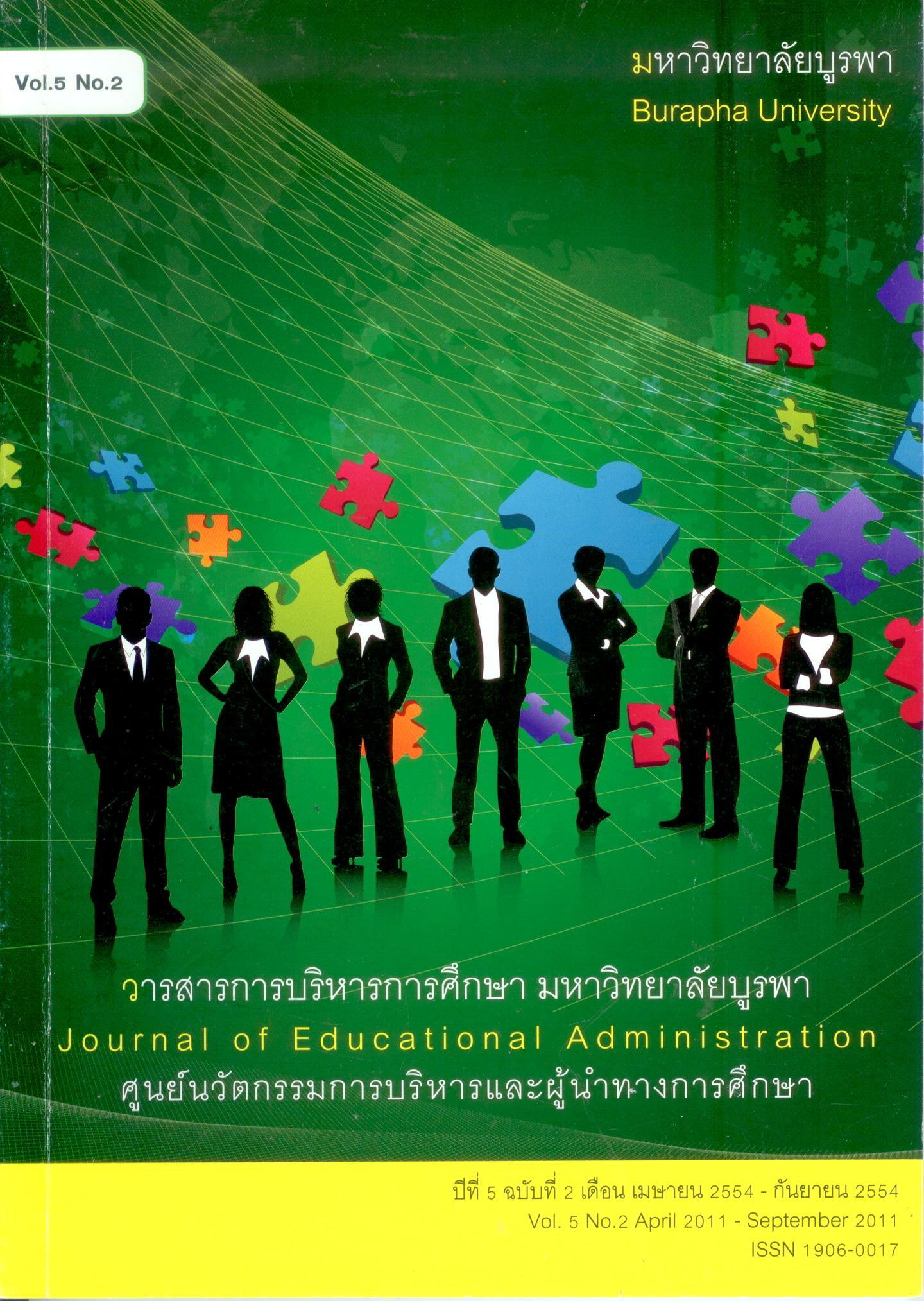รูปแบบการดำเนินการประกันคุณภาพการศึกษา ที่ผ่านการประเมินในระดับดี: กรณีศึกษามหาวิทยาลัยราชภัฎนครปฐม (Model of educational quality assurance of the university at good level : A case study of nakhonpathomrajabhat university)
บทคัดย่อ
บทคัดย่อ
การวิจัยนี้มีวัตถุประสงค์ เพื่อศึกษารูปแบบการดำเนินการประกันคุณภาพการศึกษาของมหาวิทยาลัยราชภัฎนครปฐม และเพื่อศึกษาปัจจัยและเงื่อนไขที่ส่งผลต่อการดำเนินการประกันคุณภาพการศึกษาของมหาวิทยาลัยราชภัฎนครปฐม ที่ทำให้ผ่านการประเมินในระดับดี การวิจัยครั้งนี้เป็นการวิจัย เชิงคุณภาพ เครื่องมือที่ใช้ในการวิจัย ได้แก่ การสัมภาษณ์เชิงลึก การสัมภาษณ์กลุ่ม และการสังเกตแบบไม่มีส่วนร่วม ข้อมูลปฐมภูมิรวบรวม จากกลุ่มตัวอย่างที่เป็นผู้ให้ข้อมูลสำคัญ ประกอบด้วยบุคคล 7 กลุ่ม รวมจำนวน 55 คน การเก็บรวบรวมข้อมูลทุติยภูมิโดยศึกษาจาก เอกสาร และเว็บไซต์
ผลการวิจัยพบว่า รูปแบบการดำเนินการประกันคุณภาพการศึกษาของมหาวิทยาลัย
ราชภัฎนครปฐม ประกอบด้วย บริบท ได้แก่ สภาพแวดล้อม ปรัชญา นโยบาย วัตถุประสงค์ วิสัยทัศน์ แผนยุทธศาสตร์ในการดำเนินงานหลักของมหาวิทยาลัย ปัจจัยนำเข้า ได้แก่ ผู้บริหาร อาจารย์ บุคลากร นักศึกษา งบประมาณ หลักสูตร และอาคารสถานที่ ซึ่งปัจจัยเหล่านี้ส่งผลต่อกระบวนการที่ใช้ ซึ่งได้แก่ กระบวนการบริหารจัดการ กระบวนการเรียนการสอนกระบวนการวิจัย กระบวนการบริการวิชาการแก่สังคม รวมทั้งกระบวนการทำนุบำรุงศิลปวัฒนธรรม ซึ่งทำให้เกิดผลผลิตทั้งด้านปริมาณและคุณภาพในทุกๆ ด้านของกระบวนการ และอาจเกิดผลลัพธ์ ซึ่งได้แก่ ความศรัทธาของประชาชนต่อมหาวิทยาลัยและการสนองด้านกำลังคนของประเทศ มหาวิทยาลัยราชภัฎนครปฐมได้ดำเนินการประกันคุณภาพการศึกษาภายในให้เป็นส่วนหนึ่งของการบริหารการศึกษาตามปกติ โดยมีการแต่งตั้งคณะกรรมการดำเนินการประกันคุณภาพการศึกษา และดำเนินการโดยยึดหลักวงจร PDCA ซึ่งประกอบด้วย 4 ขั้นตอน คือ การวางแผนการปฏิบัติ การตรวจสอบ และการปรับปรุงแก้ไข และพัฒนา ซึ่งมหาวิทยาลัยราชภัฎนครปฐมได้จัดทำรายงานการประเมินตนเองทุกปี และทำการประเมินคุณภาพการศึกษากายนอกทุก 5 ปี และพบว่าปัจจัยและเงื่อนไขที่ส่งผลต่อการดำเนินการประกันคุณภาพการศึกษาของมหาวิทยาลัยราชภัฎนครปฐมที่ทำให้ผ่านการประเมิน ในระดับดี แบ่งเป็น 2 กลุ่ม คือ ปัจจัยภายใน ได้แก่ ปัจจัยทางด้านภาวะผู้นำของผู้บริหาร ปัจจัยด้านทางโครงสร้างขององค์กร ปัจจัยทางด้านบุคลากร ปัจจัยทางด้านเทคโนโลยี ปัจจัยด้านวัฒนธรรมองค์การ ปัจจัยด้านกายภาพ และปัจจัยทางด้านการประกันคุณภาพา ส่วนปัจจัยภายนอก ได้แก่ ปัจจัยด้านเศรษฐกิจสังคม และปัจจัยด้านการเมือง
ABSTRACT
The purposes of this research were to study the model of Educational Quality Assurance of Nakhon Pathom Rajabhat University and to find out some factors enhancing the execution of educational quality assurance of the university at good level. This qualitative research employed the three major methods of collecting data namely In-depth interview, Group interview and Nonparticipant observation. The primary data were collected from the fifty-five key informants divided into seven groups; whereas, the secondary data were collected by reviewing the pertinent documents and websites.
The result obtained from this research indicated that the model of Educational Quality Assurance of Nakhon Pathom Rajabhat University comprised of two main factors namely the Contexts and the Input. The Contexts of the model included the environment, the philosophy, the policy, the objectives, the vision and the strategic working plan of the university. In addition, the Input of the model included administrators, teaching staff, supporting staff, students, budget, curricular and infrastructures. It was found that all of these factors influenced both of the quality and quantity of the outputs of the six important processes namely the administration process, the teaching and learning process, the research process, the academic service for society process as well as the art and culture restoration process. The factors also caused the trust of people as well as the human resource supply to the university. It was also found that the Internal Educational Quality Assurance was considered part of the educational administration of the university. A committee was set to implement the Internal Educational Quality Assurance complying with the PDCA Cycle with four stages namely Planning, Doing, Checking and Acting. The university has done the Internal Self Assessment Report once a year and also the External Self Assessment Report once every five year. It was also found that two factors enhancing the execution of educational quality assurance of the university at good level namely: 1) the Internal Factors including the leadership of administrators, the organizational structure, human resources, technologies, organizational culture, physical factors and the process of Quality Assurance and 2) the External Factors including the socio-economy and the politics of the country.


